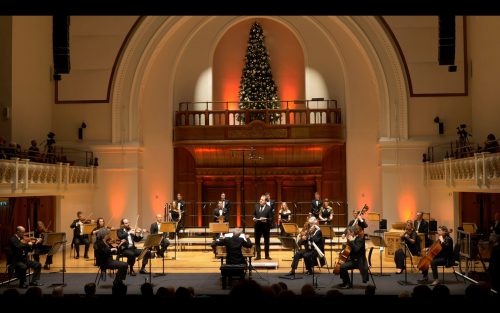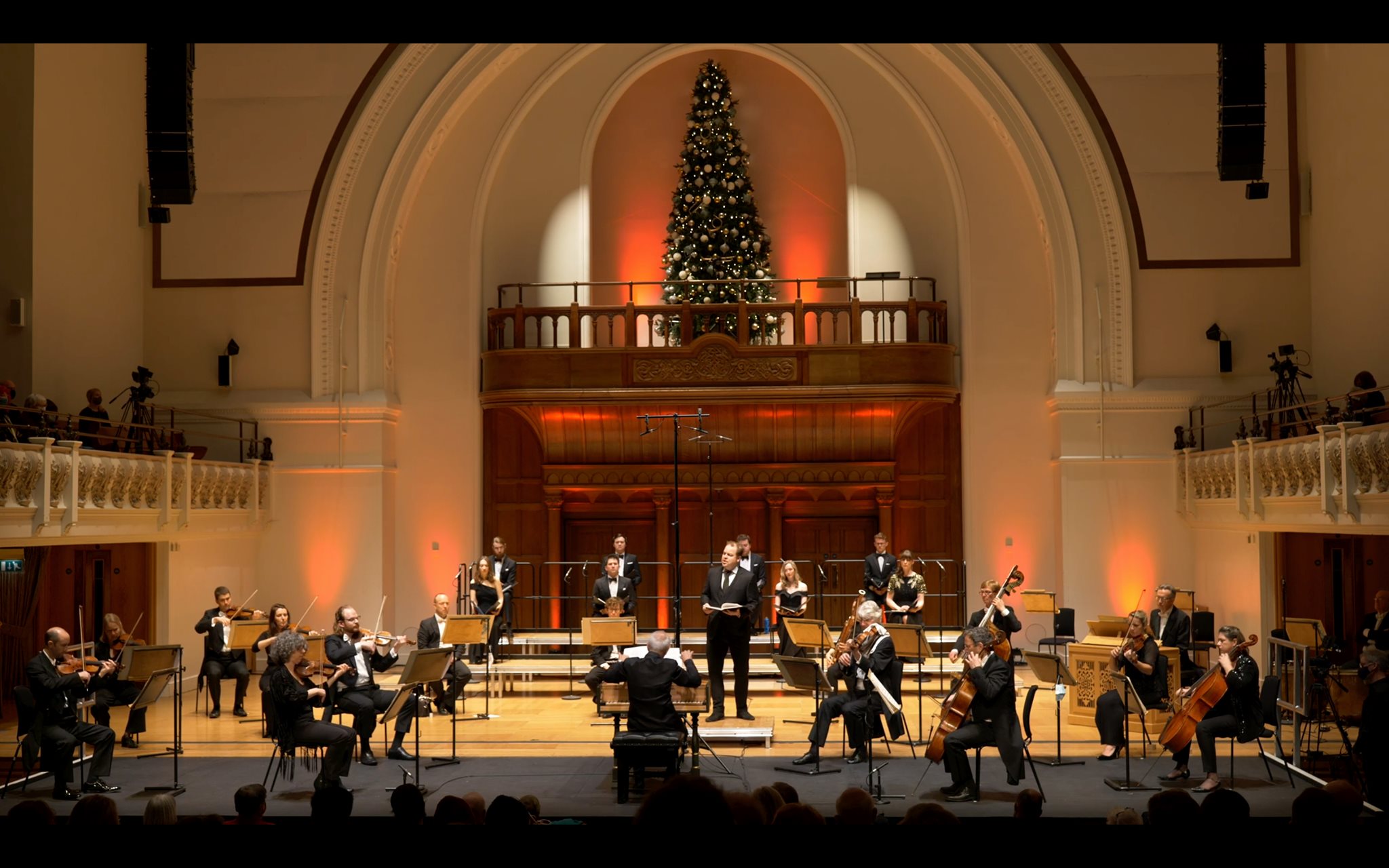 United Kingdom Handel, Messiah HWV 56 (shortened version): Carolyn Sampson (soprano), Iestyn Davies (countertenor), Andrew Staples (tenor), Matthew Brook (bass), VOCES8, English Chamber Orchestra / Nicholas Kraemer (director / harpsichord). Cadogan Hall, London, 11.12.2020. Streamed via Live from London Christmas (click here). (CC)
United Kingdom Handel, Messiah HWV 56 (shortened version): Carolyn Sampson (soprano), Iestyn Davies (countertenor), Andrew Staples (tenor), Matthew Brook (bass), VOCES8, English Chamber Orchestra / Nicholas Kraemer (director / harpsichord). Cadogan Hall, London, 11.12.2020. Streamed via Live from London Christmas (click here). (CC)

Normally the VOCES8 Messiah involves 200 people squeezed into the VOCES8 Centre, with VOCES8 and Apollo5 and friends as performers. Here, in the larger stage of the Cadogan Hall (with a tremendous Christmas tree towering above the stage), we were treated to a performance of terrific spirit that was little short of revelatory. The thinned-down chorus – a mere eight, but what a dynamic range VOCES8 can boast! – meant that texture was always clear, a trait that extended to the orchestral contribution. Details that so often get lost shone; in a time of closing down and fear, this was a performance of bright hope.
This was a shortened Messiah, coming in at around one hour 25 minutes; it was performed twice in one day (singing an uncut Messiah twice would be possibly too much). The chosen trajectory works perfectly as a narrative included:
Part I: Scenes 1 (Isaiah’s Prophesy of Salvation), 3 (The prophesy of Christ’s birth) and 4 (The annunciation to the shepherds), plus Scene 5, ‘Rejoice greatly’
Part II (slightly re-ordered): ‘He was despised’; ‘All they that see Him’; ‘He trusted in God’; ‘Thy rebuke’; ‘Behold, and see if there be any sorrow’; ‘He was cut off’; ‘But thou didst not leave His soul’; ‘The Lord gave the word’; ‘How beautiful are the feet’; ‘Why do the nations?’; ‘Let us break their bonds’; ‘He that dwelleth’; ‘Hallelujah’
Part III: Scene 1 (The Promise of Eternal Life), 2 (The Day of Judgement) and 4 (The Acclamation of the Messiah).
Yes, we miss ‘His Yoke is Easy’, ‘All we like sheep’, and more; but the fact was this felt like a logical, and most importantly, satisfying, whole.
The English Chamber Orchestra (led by Stephanie Gonley) was on radiant form, perfectly attuned to Handel’s mode of utterance. From the start, this was to be a special performance. How tenderly the Sinfonia began, almost caressed into being; and what life the main body of the Sinfonia had. A deliberately light texture meant the strands were crystal clear.
Andrew Staples led with ‘Comfort ye,’ his vocal tone pure and beautiful, his decorations of the line perfectly judged, with conductor Nicholas Kraemer finding huge tenderness in the strings; ‘Ev’ry Valley’ was characterised by perfectly clean intervals (and incredibly impressive breath control – is there a pair of bellows attached to Staples we can’t see?).
The choruses, given the eight-strong nature here, have a sort of luminescent translucency: ‘And the glory of the Lord’ is a case in point, the final ‘And the mouth of the Lord hath spoken it’ exuding a sort of halo. A sprightly ‘For unto us a Child is born’ found sopranos absolutely together; those unison semiquavers had the sort of accuracy a larger choir can never achieve. And what a surprising strength came at the choruses ‘The Lord gave the word’ and ‘Let us break our bonds asunder’. The ‘Hallelujah’ chorus increases in radiance this way (people seemed to stand from what I could see, given that a couple of them got in the way of the camera).
Countertenor Iestyn Davies is another high-profile soloist: ‘O thou that tellest good tidings to Zion’ took on a perfect purity (he has the lower range strength too). Kraemer’s sprightly tempo allowed the slowing for ‘Behold your God’ to take full dramatic effect. The bass of Matthew Brook has great presence; veiled at ‘For behold, darkness shall cover the earth’; his octaves with the orchestra at ‘The people that walked in darkness’ held great import. Brook’s virtuosity in ‘Why do the nations rage so furiously together?’ was remarkable, true Handel singing at its finest (the diction expertly managed, too).
The so-called ‘Pifa,’ or Pastoral Symphony, had an open, raw rusticity; Kraemer knows exactly the sound he wants and how to get it. We had to wait until now to enjoy Carolyn Sampson, in her sequence of recitatives and accompagnatos (how exciting the second, ‘And suddenly there was an angel’ and the air ‘Rejoice greatly’. Lovely how she turned to watch the chorus for their contribution in this. They remained seated, the sound bejewelled by the two trumpets of Neil Brough and Paul Sharp; later, Andrew Staples did the same thing, turning towards the chorus for ‘He trusted in God’. Sampson’s voice flew, of clarion silver, in that ‘Rejoice greatly’, with not a touch of harshness. A great way to conclude the first part.
Part II began with ‘He was despised,’ Davies offering a perfect marriage of diction with line, the perfect carrier for this affecting sound painting of the Messiah as a ‘man of sorrows … acquainted with grief’, while it was Carolyn Sampson that positively illuminated the final part with an unforgettable ‘I know that my Redeemer liveth’. The final accolades have to go to VOCES8, though, carrying through an a ‘Worthy is the Lamb’ and ‘Amen’ that carried great gravity and grandeur. Notable how the chorus managed to maintain a sense of legato over rests in the ‘Amen’ closing passages.
And so, the audience stood for a second time in the night (some might arguably the second time was the justifiable one) to pay tribute to a performance of radiant joy in times of darkness. The power of music to console, uplift and above all heal was here in all its majesty.
Colin Clarke
